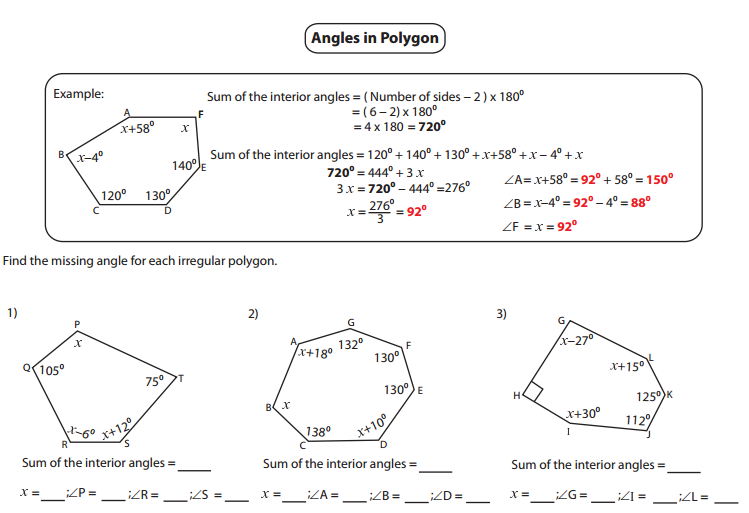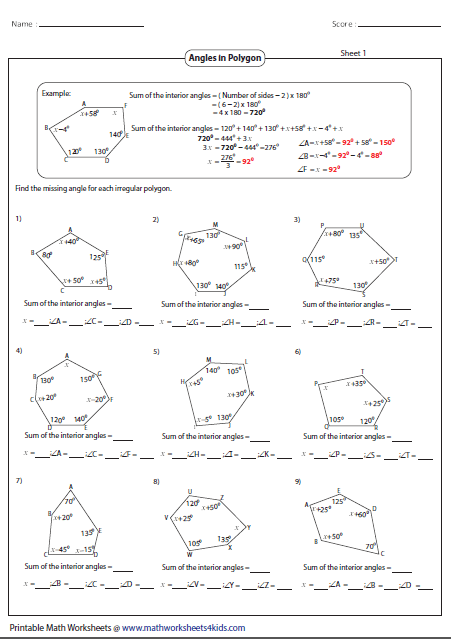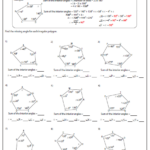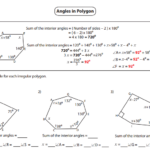Finding Missing Angles Of Polygons Worksheet – If you have been struggling to learn how to find angles, there is no need to worry as there are many resources available for you to use. These worksheets will help you understand the different concepts and build your understanding of these angles. Using the vertex, arms, arcs, and complementary angles postulates, students will learn how to find unknown angles.
Identifying angles
Identifying angles worksheets help students understand the concept of right angles and obtuse angles. An angle with one horizontal leg and two or more vertical legs is a right angle. An acute angle is best represented visually by its base leg. In these worksheets, students identify angles that are nearly right angles.
These worksheets are an excellent way to learn about angles. They are divided into basic and advanced levels and cover different types of angles. They are also great for helping students learn the relationship between angles and real-world objects. Many are free to download and use. After students have learned the basics, they can begin to analyze more advanced angles.
The types of angles are described on a chart for Grades 5 and 6. These worksheets can be printed and used by students whenever they are needed. The angles are also classified by their magnitudes. There are three types of angles: acute, right, and reflex.
Identifying vertex
A vertex is the intersection of two lines or rays at a point. It is the highest or lowest point of an angle. The vertex of an angle is also known as its middle or the vertex point. An angle can have one or more vertices, and the number of vertices will vary. A triangle has three vertices, while a pentagon has five.
To learn about the different types of angles, use a worksheet that identifies the vertex and the arms. These worksheets have 20 problems that children can complete. They will be able to identify the vertex, arms and angles in pairs and they will also learn how to name each angle by its vertex. You will also learn about the different types of angles, such as supplementary and complementary angles.
Identification of arms
Angle worksheets are useful for students to learn about the different types of angles and their relationships. Each worksheet contains 10 questions about different angles. Some of the questions include naming arms and vertices, and identifying complementary or supplementary angles. Another type of worksheet requires students to identify the sides and length of a right-angled triangle.
Angles Worksheets are an excellent resource for classroom use, and can be used as handouts or projected onto the overhead projector. For ease of use, you can print them on acetate. In addition to providing the student with practice problems, these worksheets also include an answer key for those who might need to refer back to them.
Angles are formed when two rays intersect at the same spot. An angle is considered to be adjacent if it shares a common vertex, or side. In other words, adjacent angles are always adjacent. The common arm of adjacent angles has non-common arms.
Identifying arcs
Students can learn more about circles by using the Identifying Arcs worksheets. An arc is a section of a circle’s circumference that is defined and measured by its central angle and its length. 128 degrees is the sum of all angles inscribed in a circle. Students will often be asked to provide one of these measurements on these worksheets.
Identifying arcs worksheets are great for high school students, as these problems are a little more challenging. Some worksheets ask students to divide the circumference by the central angle to determine the length of an arch’s sector. They can also have students solve problems that require them to find the length of an arc to two decimal places.
These worksheets will teach students how to measure an arc’s length. Students will be able to see that the length of an arc is equal to its circumference multiplied with its angle. Students will also be able to measure and compare lengths of arcs, and calculate the circumference in degrees.





